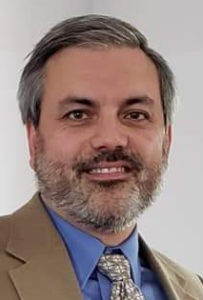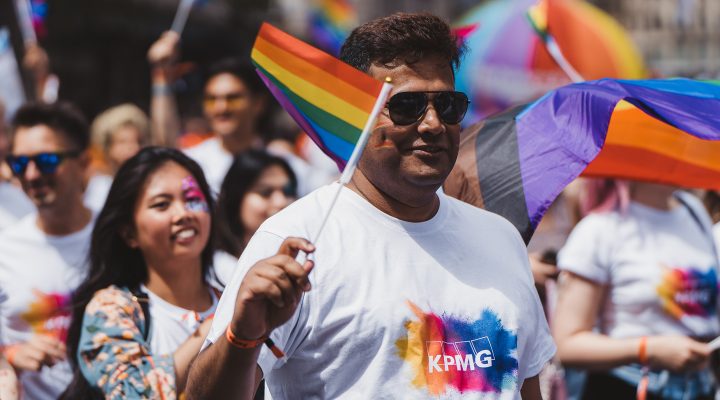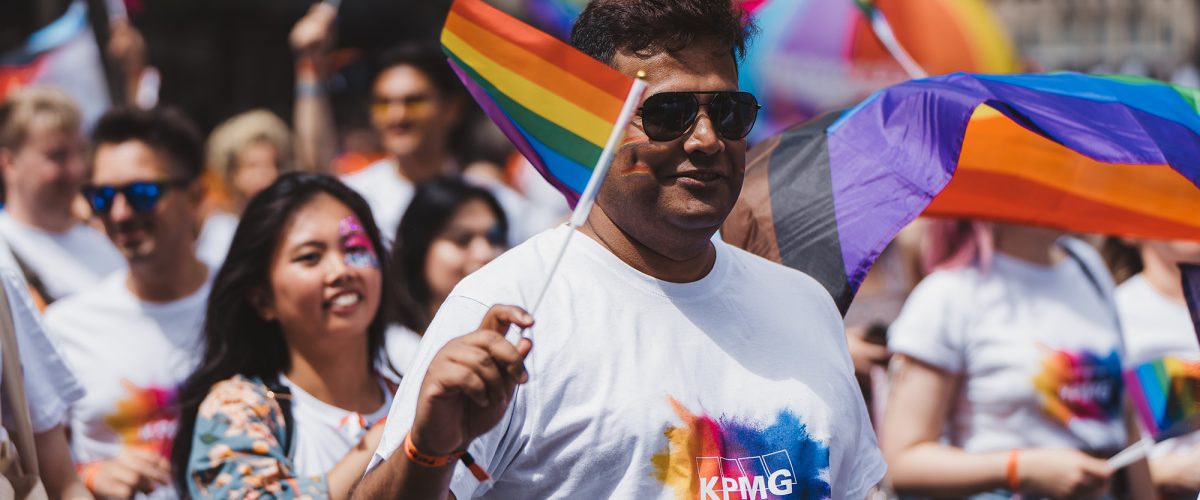I grew up in a small town of about 25,000 people. Our high school mascot was a lion, so it was natural for us to speak in terms of having “pride.”
The big block letters in the band hall read “PRIDE,” reminding us of the decades of highest honors achieved in marching and concert competitions. Likewise, our sports teams were coached to have pride in themselves, their team and their alma mater.
However, in the conservative church of my youth, I oftentimes was counseled on the moral ills of having pride. Citing Proverbs 16:18, I was warned of the destructive pitfalls of having a prideful spirit. Needless to say, I was quite confused by the prevalent hailing and scolding of aspiring to be a prideful person.

Patrick Wilson
The Merriam-Webster dictionary explains the diversity of the use of the term “pride.” The term does refer to a group of lions who live together (hence the connection with our school mascot). The term also can refer to an exaggerated self-esteem, having conceit or being arrogant (hence the caution of the proverb). However, the first definition cited is to have a reasonable sense of self-esteem, confidence, satisfaction or self-respect. This is the virtue I believe my high school sought to nurture in us as adolescents.
The dictionary also defines pride to refer to having solidarity for a group that is marginalized (such as the activism of Black pride) or having events to affirm the rights, equality and culture of a marginalized group (such as the LGBTQ community).
The first Pride marches occurred on June 28, 1970, on the one-year anniversary of the Stonewall Uprising, where police raided the Stonewall Inn, a gay club in Greenwich Village. The riot and protests that followed were the historic catalyst for the gay rights movement in the United States and much of the world.
First in New York, Los Angeles and Chicago and now in many cities across the United States, people gather for walks, parades and festivities to advocate for equality and activism, typically in the month of June, which is now known as “Pride Month.”
As a white, heterosexual, cisgender male, it would be easy for me to dismiss this form of “pride.” I am not targeted by the hatred, abuse and inequality aimed at the LGBTQ community. However, over the last several years, I have grown increasingly aware of my own privilege and moral responsibility to walk alongside other groups who have been marginalized by the American mainstream and especially by many evangelical churches and pastors.
I first wrote about my conviction and call to action in a former article with Baptist News Global, “Learning to Breathe in the Spirit by Confessing “I Can’t Breathe’” more than two years ago.
So, here are some of the reasons I will be participating at the LGBTQ Pride event in my community this weekend, and I encourage you to consider joining with me:
- With privilege comes responsibility. I am a person of privilege, and it is my duty as an image bearer of God to avoid using that privilege to exert power over others. Instead, I am compelled to use the opportunities that are afforded to me to stand with and for those who do not have the same advantages I do. This compels me to walk alongside those who are pushed to the margins and to endure a small portion of the persecution they experience on a regular basis.
- LGBTQ discriminatory laws are being debated all across the country. As of May 2023, a record setting 500 anti-LGBTQ bills had been introduced in state legislatures across the United States. About 45 of these laws have been passed already, further marginalizing the LGBTQ community. Many of these laws limit access to ongoing medical care and restrict equal opportunity for transgender and nonbinary people, further regulating them to secondary status in society.
- Tremendous numbers of LGBTQ teens are considering and committing suicide. According to The Trevor Project, suicide is the second leading cause of death among young people ages 10 to 24, and LGBTQ youth are more than four times as likely to attempt suicide than their peers. It is estimated that 1.8 million LGBTQ youth seriously consider suicide each year, which equates to one every 45 seconds. This is about 45% of LGBTQ youth and more than 50% of transgender and nonbinary youth.
“LGBTQ youth are more than four times as likely to attempt suicide than their peers.”
- The best way to understand and grow is to be with people who experience life differently. Over the last several years, I have sat down with many in the LGBTQ community. I’ve attended many of their events, listened to their views of spirituality and shared meals together with them. Throughout these experiences, I have learned much about their struggles, their hurts and their hopes for a brighter future. I have developed connections and friendships with them that have enhanced my life, and that is worth celebrating.
- Following Jesus compels me to be kind, compassionate and friends to all people. Jesus modeled inclusion. He welcomed people into his inner circle from various political factions. He advocated for those of differing genders and ethnicities. He socialized with people who were viewed by the religious elite as sinful and unacceptable. Jesus is the ultimate example his followers model their lives after. For me that includes befriending and being compassionate to all people, without judgment or even evaluation of their actions. The Golden Rule compels me to treat people as I hope to be treated by others — with full acceptance, kindness and compassion.
I first attended my local LGBTQ Pride festival last summer. I was taken aback by the joy on people’s faces. There was singing, dancing and laughing. Food trucks showed up to provide added exposure and festive foods. Kids ran through the park and played games. There was face painting, a tie-dye station for coloring T-shirts, and a speaker who called for advocacy. It was a joyous celebration!
“I sensed the Spirit affirmed in my soul that this is how the church should be.”
I was drawn in, welcomed and embraced at the Pride festival. I did not have to become queer to be accepted. I sensed the Spirit affirmed in my soul that this is how the church should be. People should not have to change who they are to be accepted, welcomed and valued in the church. We can learn a lot from our LGBTQ friends.
I am striving to be an ally for those in the margins. A couple years ago, I heard this acrostic and continue to use it as a goal for my advocacy with others such as the LGBTQ community:
A = Action: It is not enough for us to say we love others or we want them to be successful. We have to take action and put feet to our advocacy for others.
L = Listening: In order to better understand the life experiences of others, we have to be willing to push away our pre-judgments and hear their stories. With an open heart of empathy, we can learn more about their experiences, struggles and triumphs. Our advocacy is disconnected apart from active listening to the lives of those we seek to support.
L = Learning: If we want to be an ally to those who are different than us, we have to be willing to grow in our understanding of something that is foreign to our own life experiences. Through seeking a deeper understanding of their world, we are better equipped to advocate for them and their rights.
Y = Yielding: Giving our time to the cause of advocacy means we experience life with others. Advocating for others necessitates that we save space to support them when needed and befriend them throughout the highs and lows of everyday life.
A beginning step toward allyship is to attend a local Pride walk, parade or festival in your community. It is time for the church to take “pride” in walking alongside the LGBTQ community, not in condemnation or critique but in love and acceptance.
This past winter, I went through the extensive training process of becoming a crisis management counselor with The Trevor Project. Each week, I engage with distressed and oftentimes suicidal teens or young adults. The most common reasons I encounter when counseling severely troubled LGBTQ youth is that they are belittled and condemned by the two groups they admire the most: their church leaders and their parents.
“Until the followers of Jesus act in the way of Jesus, the people of the world will never fully experience the love of Jesus.”
Until the followers of Jesus act in the way of Jesus, the people of the world will never fully experience the love of Jesus. However, if we are willing to leave the comfort of our privilege and step into the shadows of the margins of society, embracing others with the grace of God, we just might be the embodiment of the presence of Jesus in the world today, bringing the gospel to life.
Let us be a people who boast in the Lord — a God who delightfully takes pride in the creation of all human beings. Let us join with God in the celebration of others and the divine goodness showered on us all. Pride, kept in moderation, is a holy and right(eous) thing. It signifies that something or someone matters, is important and has value.
To my LGBTQ friends, I say, “You matter!” And, I take pride in saying that!
Patrick Wilson has served as a pastor for 25 years in Dallas and Austin, Texas, and most recently in in Rolla, Mo., where he now leads a new community of faith, CrossRoads. He is a graduate of Baylor University, earned two master’s degrees at Southwestern Baptist Theological Seminary and a doctor of ministry degree from Logsdon Seminary.
Related articles:
The right’s zero-tolerance policy on Pride | Opinion by Mark Wingfield
Dear closeted queer one, Pride is for you | Opinion by Amber Wylde
Pride month and the unhindered gospel | Opinion by Stephen Shoemaker


